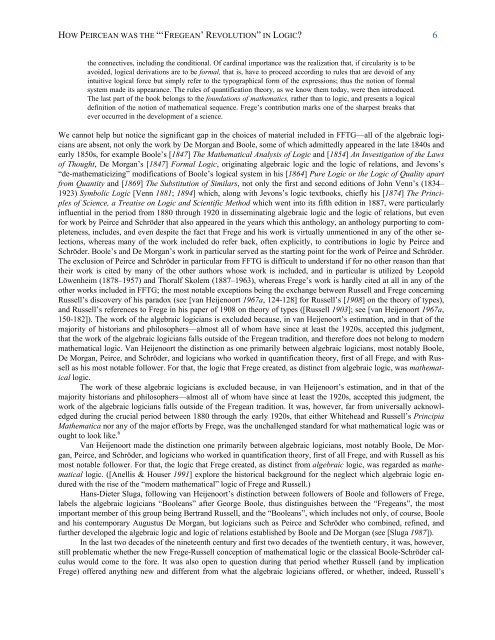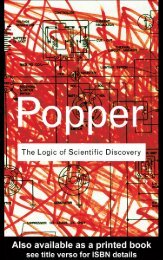Create successful ePaper yourself
Turn your PDF publications into a flip-book with our unique Google optimized e-Paper software.
HOW PEIRCEAN WAS THE “‘FREGEAN’ REVOLUTION” IN LOGIC? 6<br />
the connectives, including the conditional. Of cardinal importance was the realization that, if circularity is to be<br />
avoided, logical derivations are to be formal, that is, have to proceed according to rules that are devoid of any<br />
intuitive logical force but simply refer to the typographical form of the expressions; thus the notion of formal<br />
system made its appearance. The rules of quantification theory, as we know them today, were then introduced.<br />
The last part of the book belongs to the foundations of mathematics, rather than to logic, and presents a logical<br />
definition of the notion of mathematical sequence. Frege’s contribution marks one of the sharpest breaks that<br />
ever occurred in the development of a science.<br />
We cannot help but notice the significant gap in the choices of material included in FFTG—all of the algebraic logicians<br />
are absent, not only the work by De Morgan and Boole, some of which admittedly appeared in the late 1840s and<br />
early 1850s, for example Boole’s [1847] The Mathematical Analysis of Logic and [1854] An Investigation of the Laws<br />
of Thought, De Morgan’s [1847] Formal Logic, originating algebraic logic and the logic of relations, and Jevons’s<br />
“de-mathematicizing” modifications of Boole’s logical system in his [1864] Pure Logic or the Logic of Quality apart<br />
from Quantity and [1869] The Substitution of Similars, not only the first and second editions of John Venn’s (1834–<br />
1923) Symbolic Logic [Venn 1881; 1894] which, along with Jevons’s logic textbooks, chiefly his [1874] The Principles<br />
of Science, a Treatise on Logic and Scientific Method which went into its fifth edition in 1887, were particularly<br />
influential in the period from 1880 through 1920 in disseminating algebraic logic and the logic of relations, but even<br />
for work by Peirce and Schröder that also appeared in the years which this anthology, an anthology purporting to completeness,<br />
includes, and even despite the fact that Frege and his work is virtually unmentioned in any of the other selections,<br />
whereas many of the work included do refer back, often explicitly, to contributions in logic by Peirce and<br />
Schröder. Boole’s and De Morgan’s work in particular served as the starting point for the work of Peirce and Schröder.<br />
The exclusion of Peirce and Schröder in particular from FFTG is difficult to understand if for no other reason than that<br />
their work is cited by many of the other authors whose work is included, and in particular is utilized by Leopold<br />
Löwenheim (1878–1957) and Thoralf Skolem (1887–1963), whereas Frege’s work is hardly cited at all in any of the<br />
other works included in FFTG; the most notable exceptions being the exchange between Russell and Frege concerning<br />
Russell’s discovery of his paradox (see [van Heijenoort 1967a, 124-128] for Russell’s [1908] on the theory of types),<br />
and Russell’s references to Frege in his paper of 1908 on theory of types ([Russell 1903]; see [van Heijenoort 1967a,<br />
150-182]). The work of the algebraic logicians is excluded because, in van Heijenoort’s estimation, and in that of the<br />
majority of historians and philosophers—almost all of whom have since at least the 1920s, accepted this judgment,<br />
that the work of the algebraic logicians falls outside of the Fregean tradition, and therefore does not belong to modern<br />
mathematical logic. Van Heijenoort the distinction as one primarily between algebraic logicians, most notably Boole,<br />
De Morgan, Peirce, and Schröder, and logicians who worked in quantification theory, first of all Frege, and with Russell<br />
as his most notable follower. For that, the logic that Frege created, as distinct from algebraic logic, was mathematical<br />
logic.<br />
The work of these algebraic logicians is excluded because, in van Heijenoort’s estimation, and in that of the<br />
majority historians and philosophers—almost all of whom have since at least the 1920s, accepted this judgment, the<br />
work of the algebraic logicians falls outside of the Fregean tradition. It was, however, far from universally acknowledged<br />
during the crucial period between 1880 through the early 1920s, that either Whitehead and Russell’s Principia<br />
Mathematica nor any of the major efforts by Frege, was the unchallenged standard for what mathematical logic was or<br />
ought to look like. 6<br />
Van Heijenoort made the distinction one primarily between algebraic logicians, most notably Boole, De Morgan,<br />
Peirce, and Schröder, and logicians who worked in quantification theory, first of all Frege, and with Russell as his<br />
most notable follower. For that, the logic that Frege created, as distinct from algebraic logic, was regarded as mathematical<br />
logic. ([Anellis & Houser 1991] explore the historical background for the neglect which algebraic logic endured<br />
with the rise of the “modern mathematical” logic of Frege and Russell.)<br />
Hans-Dieter Sluga, following van Heijenoort’s distinction between followers of Boole and followers of Frege,<br />
labels the algebraic logicians “Booleans” after George Boole, thus distinguishes between the “Fregeans”, the most<br />
important member of this group being Bertrand Russell, and the “Booleans”, which includes not only, of course, Boole<br />
and his contemporary Augustus De Morgan, but logicians such as Peirce and Schröder who combined, refined, and<br />
further developed the algebraic logic and logic of relations established by Boole and De Morgan (see [Sluga 1987]).<br />
In the last two decades of the nineteenth century and first two decades of the twentieth century, it was, however,<br />
still problematic whether the new Frege-Russell conception of mathematical logic or the classical Boole-Schröder calculus<br />
would come to the fore. It was also open to question during that period whether Russell (and by implication<br />
Frege) offered anything new and different from what the algebraic logicians offered, or whether, indeed, Russell’s





